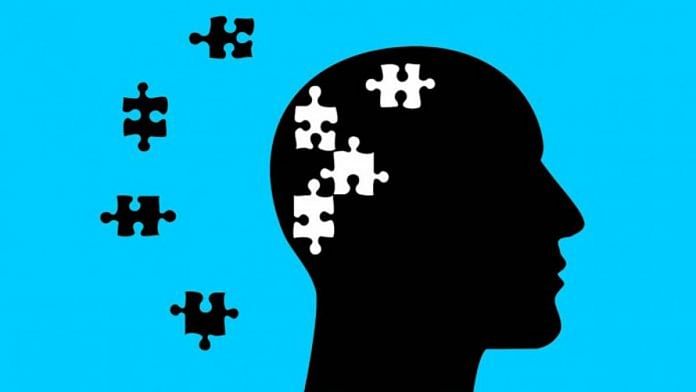New Delhi: The sale of antidepressants has gone up by nearly 23 per cent in the past one year, since the beginning of the pandemic, figures shared by the pharma industry show.
According to the All Indian Origin Chemists & Distributors (AIOCD)’s research wing (AIOCD-AWACS) — which represents more than 9 lakh pharmacists in India — the sale of the top five anti-depression drugs in the Indian market was Rs 177 crore in April 2020, which went up to Rs 218 crore in April 2021 — an increase of about 23 per cent. In comparison, the sale of these drugs in April 2019 was Rs 186 crore. This means from April 2019 to April 2020, there had been a drop of about five per cent in sales.
The medicines being referred to by the AIOCD-AWACS include Abbott’s Prothiaden, Pfizer’s Ativan, Dr Reddy’s Tryptomer and Sun Pharma’s Nexito and Nexito Plus.
Mental health experts and psychiatrists also informed ThePrint that more people have been consulting them now in comparison to the pre-pandemic days and that they have been categorising patients into three segments.
The first category of people seeking help for mental health issues are those who have recovered from Covid and are showing post recovery complications, such as depression and anxiety.
The second group includes those impacted by the general pandemic scenario, or the death of a loved one, job loss or problems in relationships.
The third category of mental health patients are those who are exhibiting withdrawal symptoms owing to unavailability or lesser availability of alcohol during the pandemic, because of lockdowns imposed by the government.
Doctors at one of the country’s top mental health institute, the National Institute of Mental Health and Neuro-Sciences (NIMHANS) in Bengaluru, also admitted that they noticed a similar surge in the number of people seeking help by the beginning of May, roughly a month after a second Covid wave began in the country.
While by the beginning of May data from the past few weeks had showed a 40 per cent surge in daily distress calls received at the helpline run by the institute, volunteers answering the helpline calls shared that the number of those requiring critical consultancy — cases where people are counselled for probable mental health and psycho-social issues such as family issues, abuse and violent behaviour — have almost doubled.
Also read: Companies will thrive only if they recognise mental health is not an individual issue
The rise of ‘fear-o-demic’
Mental health experts believe that the second Covid wave in the country has led to “fear-o-demic”, where people are worried about dying or losing their loved ones to Covid or losing their jobs.
This fear has further given rise to anxiety and depression among people. Other important factors affecting mental health are financial crisis, relationship issues, and being forced to stay indoors for several months owing to the pandemic lockdown and fear of getting infected.
According to Shivani Misri Sadhoo, founder-director, Saarthi Counselling Services, “prolonged uncertainty because of Covid”, a situation where people are unsure of when prevailing conditions will improve, add to the problem, even though the pandemic in itself is “enough to create panic and anxiety.”
“All these factors (anxiety, concern regarding future, the grim environment, bad news) have individually or jointly played havoc with the mental health of several people. Thus, medicines such as Prothiaden, Ativan, Tryptomer, Nexito and Nexito Plus have been prescribed more during the last one year, and especially the last one month.”
The counsellor added that whereas till last year she would only get one or two patients in a week who would be seeking counselling for depression, the number has now gone up to three-four.
Dr. Srinivas Rajkumar T., consultant psychiatrist and former general secretary, Resident Doctor’s Association, AIIMS, added that there has also been a jump in the number of those suffering from the symptoms of alcohol withdrawal, owing to reduced availability because of lockdowns or financial problems caused by the pandemic.
“There is also a big surge of patients having (showing symptoms of) alcohol withdrawal due to lack of availability That explains the increase in the sale of Ativan ( Lorazepam is the generic name of the drug being used to treat it),” he said.
Dr Srinivas added that the number of people seeking “first time” psychiatry consultation, after Covid recovery is also “quite significant”.
“There are many post-Covid consultations for depression, anxiety, insomnia and post traumatic stress disorder (PTSD). It is very prevalent,” he said, adding that there is an increase in the prescription of drugs because of all this. “While old patients are repeating, new patients are being added,” he said.
The most common topics that are coming up during consultations are the death of family members and financial stress, said experts.
“There is around 20-25 per cent increase in consultancies this year against last year and approximately 30 per cent increase in the past month,” said Dr. Rahul Rai Kakkar, senior consultant, psychiatrist, Narayana Hospital, Gurugram.
“The top reasons are anxiety issues regarding the well-being of self, family members and other close ones. Loss of life of family members and financial stress are common in almost all patients. Undoubtedly, prescription of anti-anxiety medicines have increased, along with (advice for) lifestyle and behavioral modifications.”
(Edited by Poulomi Banerjee)
Also read: 1 in 3 Covid patients who recovered have neurological, mental health disorders: Study in Lancet



